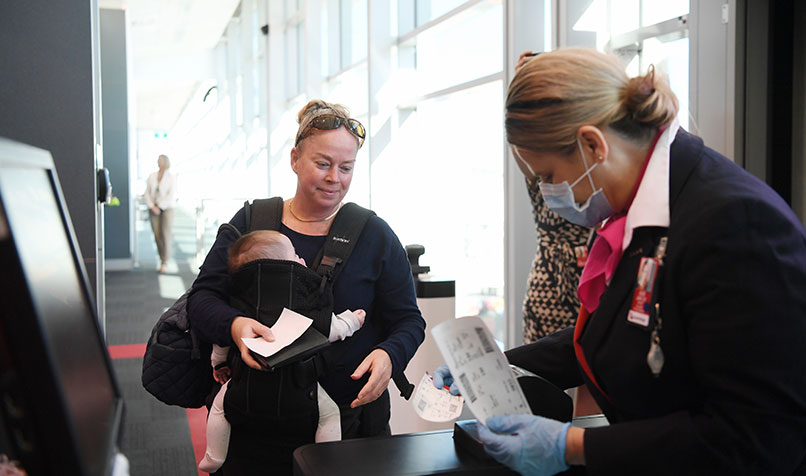Loading component...
At a glance
- The era of “box-ticking’” corporate social responsibility has been rapidly drawing to a close, with employees placing increasing importance on working for organisations with a holistic approach to CSR, as well as strong ethics and values.
- According to recent research, 69 per cent of Australians believe businesses should place as much importance on societal impact as they do on financial performance.
- Against the backdrop of widespread unemployment and job insecurity, organisations also need to focus on internal corporate social responsibility.
By Johanna Leggatt
When Peter Fuller, Micro Focus’s managing director for Australia and New Zealand, is interviewing a shortlisted job candidate, he spends more time promoting the software company’s workplace to the potential employee than the other way around.
“By that stage, we have decided that this is a person we would like to work with, so often my time in the interview is spent selling the company to them,” he says.
Fuller’s approach is based on Micro Focus’s mission to attract the top talent by offering them a compelling, ethical and dynamic workplace.
“We want to work with people who can walk out the door and get a job somewhere else,” Fuller says.
“That way, I know that people are working for us because they choose to.”
Fuller’s employee-first focus, backed by a comprehensive Corporate Social Responsibility (CSR) framework, is likely to become more commonplace in corporate suites and boardrooms after COVID-19.
“Now, more than ever, you need to hire the right people and have the right culture to support them,” Fuller notes.
“You can have the best product or service in the world, but if you don’t have the right people, you won’t get anywhere.”
Now and then

Debbie Haski-Leventhal, professor of management at Sydney’s Macquarie University Business School and author of Strategic Corporate Social Responsibility, agrees and says that the era of box-ticking CSR, in which a company merely gives money to a green cause or social fundraiser for plaudits, is over.
“I see a real shift away from this corporate philanthropic model, or what I would call ‘random acts of charity’,” Haski-Leventhal says.
“It offers no alignment with what the company stands for, and it is far from holistic.”
Interestingly, as the full effects of the global financial crisis (GFC) hit in 2008, there was “a definite turning point in CSR”, according to Haski-Leventhal.
“Many companies closed down their CSR departments and stopped giving money to charity, and this raised a lot of criticism and showed that these firms were seeing CSR as ‘nice to have’, or as side-show philanthropy,” Haski-Leventhal says.
However, she notes, some managers rose to the occasion and demonstrated “a holistic approach, taking pay cuts in order to keep their employees”.
Rosalie Wilkie, PwC Australia partner, social impact, says CSR was still evolving during the GFC, whereas these days it is much more mature.
“Around the time of the GFC, we saw business respond to a downturn essentially through redundancies, whereas now, during COVID-19, we are seeing some companies respond differently,” she says.
Wilkie points to Australian companies such as Qantas and Woolworths, which are working together to redeploy staff during the pandemic, as a sign of a more evolved CSR approach.
Furthermore, as a result of global banking scandals, instances of corporate malfeasance and the sub-prime mortgage crises tarring the reputation of the global financial sector over recent decades, more corporations are taking CSR seriously.
In Australia, as Wilkie points out, the most recent edition of the ASX Corporate Governance Principles and Recommendations now asks businesses to “instil a culture of acting lawfully, ethically and responsibly”.
Employees demand ethics
Corporate ethics are also important to employees.
According to software giant Atlassian’s Return on Action: The New Social Contract for Business report, which was completed by PwC, some 69 per cent of 1200 Australian respondents agreed that businesses should be just as concerned with their societal impact as they are with their financial performance.
The report found that only 34 per cent of people were satisfied with the amount of action their company was taking on social issues, such as cost of living or climate change.
“The interesting thing about the research was that it shows that the demand for CSR was spread across all age groups and not confined to younger people,” Wilkie says.
This is borne out by Micro Focus’s experience with CSR. The company has recently launched a new global CSR program called INSPIRE, which is built around five core commitments: employees, marketplace, ethics and values, environment and sustainability, and community and social impact.
Employees of all ages expect this kind of action, Fuller notes.
"Companies can no longer pay lip service to values and ethics, because employees demand to see real action."
“I have seen people on LinkedIn posting about how their companies have helped out after the Australian bushfires or during the pandemic,” he says.
“That is quite a new development, and it shows what really matters to employees.”
In fact, Haski-Leventhal has seen a real shift over the past decade with companies that are now adopting a more comprehensive approach to CSR by aligning corporate values with those of their employees, customers and clients.
This includes “ensuring there is no modern slavery in their supply chains, that staff are looked after, and they have a sustainable, ‘green’ footprint in the way their product is created”.
At Micro Focus, staff are given four days of additional paid leave a year to pursue what they are passionate about – whether it’s volunteering for the Cancer Council’s Daffodil Day or helping with their local Country Fire Authority.
Employees expect meaningful action on climate change, too. “We’re a software company, so we don’t have tech byproducts as such, but we do look at how efficient we are within our office space,” Fuller says.
“We do as much as we can.”
Worker wellbeing during COVID-19

According to Haski-Leventhal, COVID-19 has become a litmus test for many companies as to who is genuine about ethics and values, and who is merely “green washing” – that is, paying mere lip service to values such as sustainability.
With unemployment and job insecurity at the forefront of workers’ minds, CSR must be focused internally, as well as externally.
“The internal CSR is now key,” she says.
However, it is not just about saving jobs. As Haski-Leventhal points out, COVID-19 has highlighted the integral role that wellbeing plays in the workplace. “Working from home has taken a toll on some workers, especially on their mental health,” she says.
“Employers need to ensure their employees have enough support during this time.”
Meanwhile, Wilkie has seen a groundswell of people at PwC “wanting to feel more connected and purposeful during the pandemic”.
“Our volunteer program increased by about 130 per cent after COVID-19 [arrived in Australia],” she says.
In fact, Wilkie argues that mental health “is going to be the issue of this time and will move up the corporate agenda”.
“We are seeing people go through circumstances they have never had to live through before,” she says.
“I think corporates need to elevate mental health in the CSR.”
This includes taking distinct leadership actions, such as personally checking in with staff every morning and afternoon.
“You can’t just rely on a program,” Wilkie says.
“It has to come from the top, and it has to be a real personal connection to be effective.”
Solving social problems
Of course, the pandemic also creates an opportunity to translate company ethics into meaningful change in the world.
As Wilkie notes, a healthy and equal society is good for business.
“In a crisis like this, we have had to change and innovate rapidly,” she says.
“The agility we have found – if we can adapt that to our CSR, then perhaps we can move forward in leaps and bounds as a society.”
Fuller says that companies will no doubt be compelled to turn CSR into concrete action in the wake of the social impact of the pandemic.
“Companies will have to ask how to best rebuild organisations and the economy,” he says.
“They will also ask questions like, how best to support people who don’t have jobs right now, and what will a future airline and hotel industry look like?”
Fuller points out that companies will be judged by how they answer these questions, not just financially, but whether they used their CSR as a force for good.
“Companies can no longer pay lip service to values and ethics, because employees demand to see real action,” he says.
“Word will get out very quickly if you are not following through with it.”
CPA Library resource:
How to audit your own ethics audit
The most important thing to remember is to take a holistic view.
A rigorous, ethical framework is a mindset, not a checklist, and there is no better opportunity for a change in mindset than a pandemic.
Discover your mindset by asking who you are, what you stand for, what you are known for and what you are the best at. Then, align these answers to your ethical framework.
If in doubt, look at the global Sustainable Development Goals and see how your company values align.
Investigate how decisions are made in the company. Decisions should not be based solely on the next quarter profit, but should take into account other stakeholders. Profit is important, but it should not be the sole focus of the business.
Work out how you can use your resources and people to address pressing global concerns.
Ask how CSR can be embedded in every decision and every department. Ethics must not stop with the management, but should extend through all of the branches of the company.
Source: Debbie Haski-Leventhal, professor of management at Macquarie University Business School.

